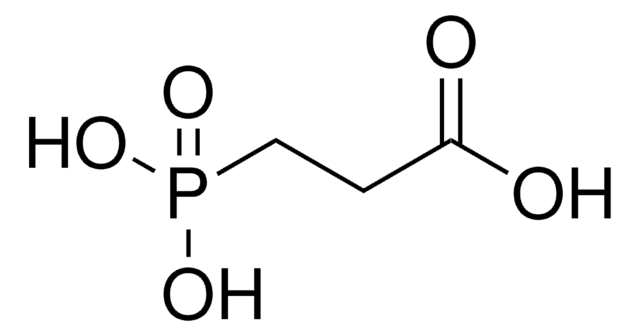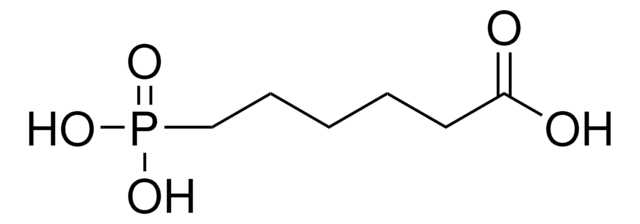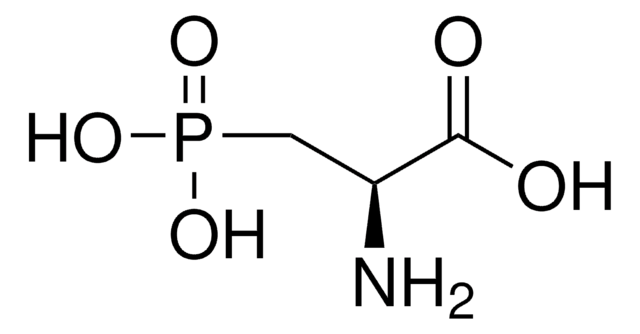284270
Phosphonoacetic acid
98%
Synonym(s):
(Carboxymethyl)phosphonic acid, 2-Phosphonoacetic acid, Fosfonoacetic acid, Phosphonacetic acid
Sign Into View Organizational & Contract Pricing
All Photos(2)
About This Item
Linear Formula:
(HO)2P(O)CH2CO2H
CAS Number:
Molecular Weight:
140.03
EC Number:
MDL number:
UNSPSC Code:
12352100
PubChem Substance ID:
NACRES:
NA.22
Recommended Products
Assay
98%
form
powder or crystals
mp
143-146 °C (lit.)
solubility
water: soluble 100 mg/mL, clear to very slightly hazy, colorless
functional group
carboxylic acid
SMILES string
OC(=O)CP(O)(O)=O
InChI
1S/C2H5O5P/c3-2(4)1-8(5,6)7/h1H2,(H,3,4)(H2,5,6,7)
InChI key
XUYJLQHKOGNDPB-UHFFFAOYSA-N
Looking for similar products? Visit Product Comparison Guide
General description
Phosphonoacetic acid inhibits specifically human cytomegalovirus DNA synthesis in virus-infected human fibroblasts. It also inhibits the synthesis of herpes simplex virus DNA in infected cells and the activity of the virus-specific DNA polymerase in vitro.
Application
Phosphonoacetic acid was used as an inhibitor of viral DNA replication, to investigate the infected cell protein 0 (bICP0) localization in infected low passage bovine cells. It was also used as a phosphorus source for microbial growth in phosphate-independent manner.
Storage Class Code
11 - Combustible Solids
WGK
WGK 3
Flash Point(F)
Not applicable
Flash Point(C)
Not applicable
Personal Protective Equipment
dust mask type N95 (US), Eyeshields, Gloves
Choose from one of the most recent versions:
Already Own This Product?
Find documentation for the products that you have recently purchased in the Document Library.
Customers Also Viewed
Lauren M Oko et al.
PLoS pathogens, 15(6), e1007849-e1007849 (2019-06-06)
Virus-host interactions are frequently studied in bulk cell populations, obscuring cell-to-cell variation. Here we investigate endogenous herpesvirus gene expression at the single-cell level, combining a sensitive and robust fluorescent in situ hybridization platform with multiparameter flow cytometry, to study the
Vincent Li et al.
Journal of molecular biology, 400(3), 295-308 (2010-05-25)
Structure-based protein sequence alignments of family B DNA polymerases revealed a conserved motif that is formed from interacting residues between loops from the N-terminal and palm domains and between the N-terminal loop and a conserved proline residue. The importance of
A Abendroth et al.
Journal of virology, 75(10), 4878-4888 (2001-04-20)
We sought to examine the effects of varicella-zoster virus (VZV) infection on the expression of major histocompatibility complex class I (MHC I) molecules by human fibroblasts and T lymphocytes. By flow cytometry, VZV infection reduced the cell surface expression of
T Sairenji et al.
The Journal of general virology, 38(1), 111-120 (1978-01-01)
This study investigated the synthesis of membrane antigen (MA) as well as virus capsid antigen (VCA) and early antigen (EA) in Daudi cells which had been superinfected with the P3HR-1 strain of Epstein-Barr virus (EBV) and then treated with trypsin
R W Honess et al.
Journal of virology, 21(2), 584-600 (1977-02-01)
Phosphonoacetic acid (PAA) inhibited the synthesis of herpes simplex virus DNA in infected cells and the activity of the virus-specific DNA polymerase in vitro. In the presence of concentrations of PAA sufficient to prevent virus growth and virus DNA synthesis
Our team of scientists has experience in all areas of research including Life Science, Material Science, Chemical Synthesis, Chromatography, Analytical and many others.
Contact Technical Service











